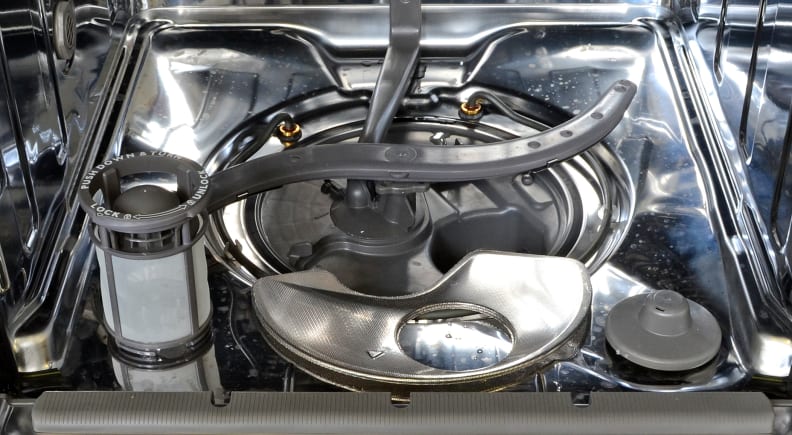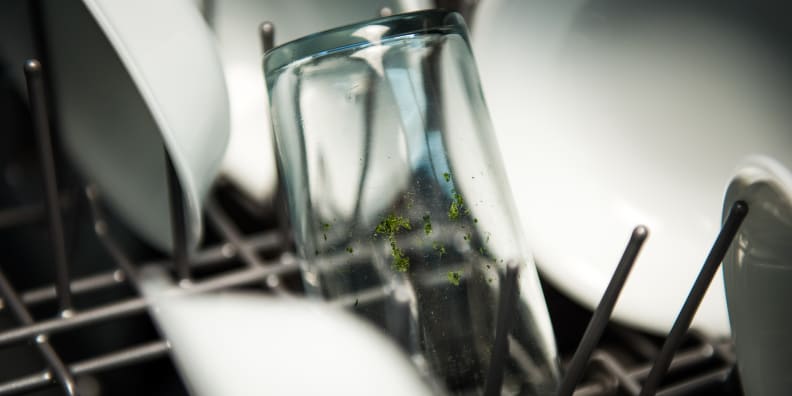Why Doesn’t My Dishwasher Actually Clean My Dishes?
Food redeposit is a pain in the neck, but you can prevent it.
 Credit:
Reviewed / Jonathan Chan
Credit:
Reviewed / Jonathan Chan
Products are chosen independently by our editors. Purchases made through our links may earn us a commission.
A word you've never heard of might be the biggest problem with your dishwasher. “Redeposit” is the technical term for what most of us just think of as schmutz, gunk, or debris. You know, the tiny little specks of food that get stuck to your dishes in the wash. Unlike food residue, which is simply the result of insufficient cleaning, redeposit is the result of loose food particles getting washed off one dish and onto another.
No one likes redeposit. It’s one of the most frustrating issues dishwasher owners face, and one that seems to occur no matter how expensive or cutting-edge a dishwasher is. So why does it keep showing up? How can you get rid of it? Who’s responsible for this? How far up does this thing go?
Relax. Most of the time, you can keep it from happening.
You see, at the bottom of every dishwasher is a little thing called a drain filter. It's responsible for catching large food particles so they don’t end up clogging your drain. Older machines used food disposals—not unlike those found in kitchen sinks—to prevent drain clogging, but they’ve since fallen out of fashion due to demand for quieter machines.

A typical dishwasher filter.
Unfortunately, many owners forget to clean their dishwasher filters. As you can imagine, these untended filters accumulate food debris in no time flat. Over time, it begins to smell, and it often gets recycled—or redeposited—back into the dishwasher, where it plasters your glasses and plates.
RELATED: Why You Need to Clean Your Dishwasher Filter
Nine times out of ten, redeposit is the result of an improperly cleaned drain filter. The good news is that filters are incredibly easy to clean. The little mesh-and-plastic contraptions simply twist out of the drain and can be quickly rinsed out in the sink. You should do it regularly.
Filters may be the primary culprit behind food redeposit, but they’re not the only one. We’ve tested and reviewed more than 100 dishwashers, and because of the heavy food stains we use in our testing, we always clean out the filter before each wash cycle. But redeposit is still an issue, even with some top-scoring models. What gives?

Thankfully, few dishwashers will ever leave redeposit this serious.
Redeposit may be caused by two other factors: pre-wash cleanliness, and simple manufacturing flaws.
Generally speaking, pre-washing your dishes isn't necessary, but some foods are more stubborn than others. If you have large chunks of matter stuck to your dishes, rinse them off. And if you've got caked on proteins (like milk, meat, and cheese), they're going to be more stubborn than fats like oil and grease. Eliminating them from the equation will greatly reduce the risk of redeposit.
Finally, some dishwashers simply underperform—there’s no getting around it. No matter how much soap and water gets into the machine, the wrong confluence of water temperature, cycle duration, and spray jet force can encourage the redeposit of food particles.
If you're doing everything right—cleaning your filter regularly and rinsing away high-risk food matter—but still dealing with redeposit, you should consider investing in a better machine.
The product experts at Reviewed have all your shopping needs covered. Follow Reviewed on Facebook, Twitter, Instagram, TikTok, or Flipboard for the latest deals, product reviews, and more.
Prices were accurate at the time this article was published but may change over time.
